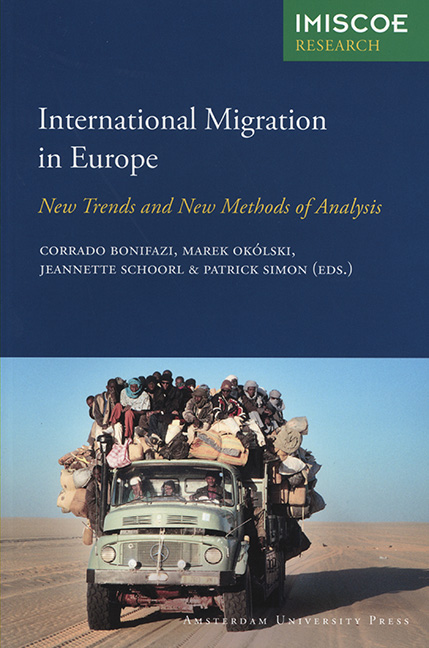Book contents
- Frontmatter
- Contents
- Preface
- 1 Introduction
- PART I NEW FORMS OF MIGRATION IN EUROPE
- PART II EVOLUTION OF REGIONAL PATTERNS OF INTERNATIONAL MIGRATION IN EUROPE
- PART III MEASURING INTEGRATION: IMMIGRANTS AND THE SECOND GENERATION
- PART IV SPECIAL SURVEYS IN INTERNATIONAL MIGRATION STUDIES
- List of Contributors
- Index
- Other IMISCOE Titles
7 - Long-Term International Migration Scenarios For Europe, 2002-2052
Published online by Cambridge University Press: 22 June 2021
- Frontmatter
- Contents
- Preface
- 1 Introduction
- PART I NEW FORMS OF MIGRATION IN EUROPE
- PART II EVOLUTION OF REGIONAL PATTERNS OF INTERNATIONAL MIGRATION IN EUROPE
- PART III MEASURING INTEGRATION: IMMIGRANTS AND THE SECOND GENERATION
- PART IV SPECIAL SURVEYS IN INTERNATIONAL MIGRATION STUDIES
- List of Contributors
- Index
- Other IMISCOE Titles
Summary
Introduction
The hypotheses regarding the future shape of international migration are not only demographic by nature, but also have to take into account various economic, political, sociological and ethnic factors. Moreover, migration is a phenomenon characterised by a much higher level of uncertainty and is much more controversial in terms of expectations for the future than fertility or mortality. For these reasons, predicting migration is very difficult and the results of various forecasts often prove to be unsuccessful, bearing very high prediction errors.
This article presents assumptions for the future development of long-term international migration in 27 European countries for the period 2002 to 2052. The assumptions have been developed to serve as an input for forecasts and simulations of population and labour force dynamics in Europe. In geographic terms, the analysis covers the European Union excepting Cyprus and Malta, plus Norway, Switzerland, as well as two EU accession countries – Bulgaria and Romania. With due respect to the demographic dispute about distinguishing between ‘forecasts’ and ‘projections’, we have used the term ‘forecast’ throughout the study to stress that the outcome reflects our beliefs about what we expect to be the possible future migration and population development paths (see Ahlburg & Lutz 1998).
The article starts with a description of legal and political developments concerning freedom of movement in Europe, as well as assumptions of the forecasts in that respect, which are shown in section 7.2. In two subsequent sections (7.3 and 7.4), qualitative migration scenarios are presented, respectively for movements among the countries under study and for population exchange with the rest of the world. These scenarios describing our knowledge-based expectations of future changes in international population flows are quantified using the algorithms described in detail in section 7.5. The results of the analysis, including the impact of the assumed scenarios on population forecasts for the selected European countries, are summarised in brief in the sixth section of the article. Finally, section 7.7 presents a synopsis of the outcomes, as well as the major conclusions of the study.
Freedom of movement in Europe: status quo and Assumptions
The high profile of migration policy in the public debate in recent years in the old EU-15 countries has greatly influenced negotiations on EU enlargement.
- Type
- Chapter
- Information
- International Migration in EuropeNew Trends and New Methods of Analysis, pp. 129 - 152Publisher: Amsterdam University PressPrint publication year: 2008



